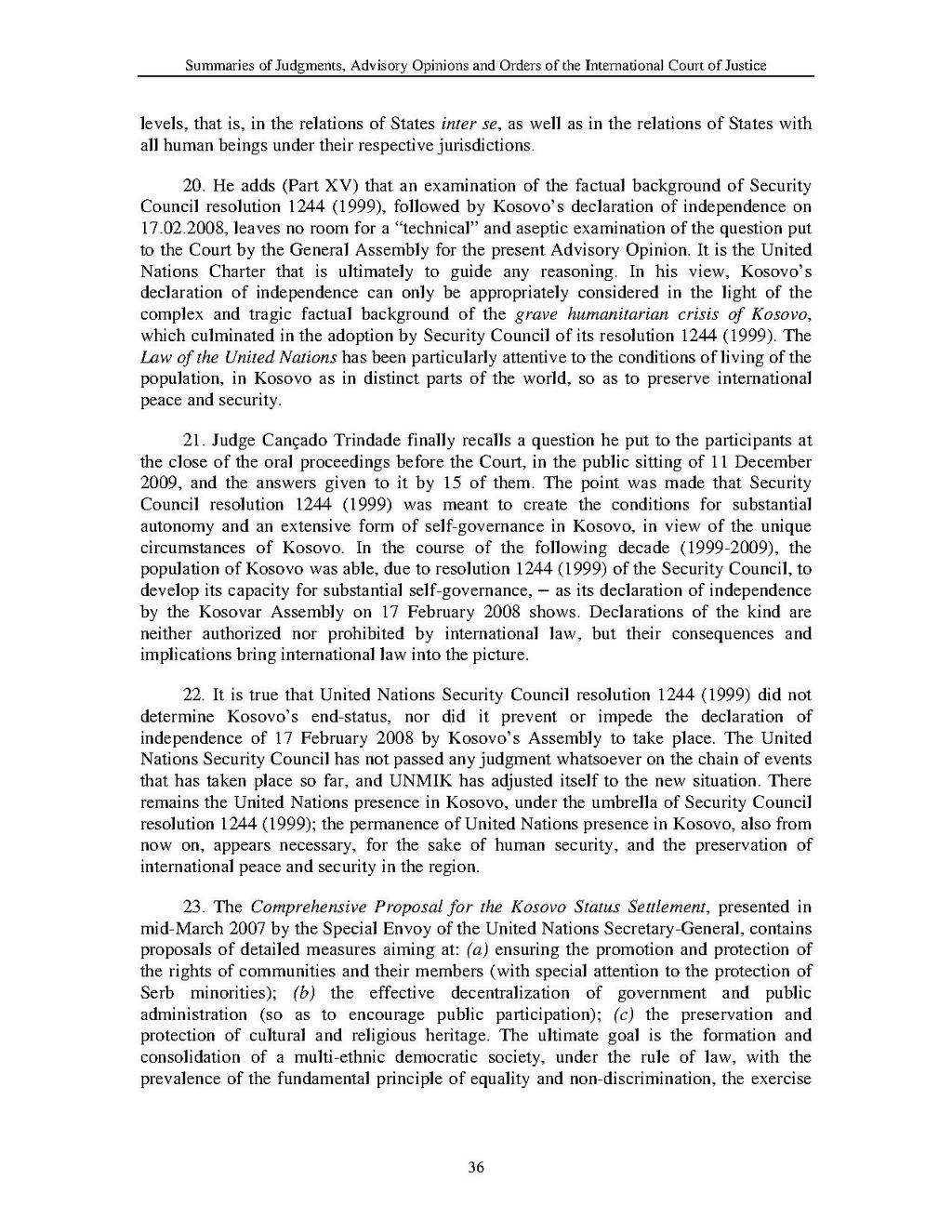Summaries of Judgments, Advisory Opinions and Orders of the International Court of Justice
levels, that is, in the relations of States inter se, as well as in the relations of States with all human beings under their respective jurisdictions.
20. He adds (Part XV) that an examination of the factual background of Security Council resolution 1244 (1999), followed by Kosovo's declaration of independence on 17.02.2008, leaves no room for a "technical" and aseptic examination of the question put to the Court by the General Assembly for the present Advisory Opinion. It is the United Nations Charter that is ultimately to guide any reasoning. In his view, Kosovo's declaration of independence can only be appropriately considered in the light of the complex and tragic factual background of the grave humanitarian crisis of Kosovo, which culminated in the adoption by Security Council of its resolution 1244 (1999). The Law of the United Nations has been particularly attentive to the conditions of living of the population, in Kosovo as in distinct parts of the world, so as to preserve international peace and security.
21. Judge Cançado Trindade finally recalls a question he put to the participants at the close of the oral proceedings before the Court, in the public sitting of 11 December 2009, and the answers given to it by 15 of them. The point was made that Security Council resolution 1244 (1999) was meant to create the conditions for substantial autonomy and an extensive form of self-governance in Kosovo, in view of the unique circumstances of Kosovo. In the course of the following decade (1999-2009), the population of Kosovo was able, due to resolution 1244 (1999) of the Security Council, to develop its capacity for substantial self-governance, — as its declaration of independence by the Kosovar Assembly on 17 February 2008 shows. Declarations of the kind are neither authorized nor prohibited by international law, but their consequences and implications bring international law into the picture.
22. It is true that United Nations Security Council resolution 1244 (1999) did not determine Kosovo's end-status, nor did it prevent or impede the declaration of independence of 17 February 2008 by Kosovo's Assembly to take place. The United Nations Security Council has not passed any judgment whatsoever on the chain of events that has taken place so far, and UNMIK has adjusted itself to the new situation. There remains the United Nations presence in Kosovo, under the umbrella of Security Council resolution 1244 (1999); the permanence of United Nations presence in Kosovo, also from now on, appears necessary, for the sake of human security, and the preservation of international peace and security in the region.
23. The Comprehensive Proposal for the Kosovo Status Settlement, presented in mid-March 2007 by the Special Envoy of the United Nations Secretary-General, contains proposals of detailed measures aiming at: (a) ensuring the promotion and protection of the rights of communities and their members (with special attention to the protection of Serb minorities); (b) the effective decentralization of government and public administration (so as to encourage public participation); (c) the preservation and protection of cultural and religious heritage. The ultimate goal is the formation and consolidation of a multi-ethnic democratic society, under the rule of law, with the prevalence of the fundamental principle of equality and non-discrimination, the exercise
36
